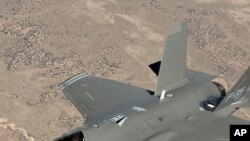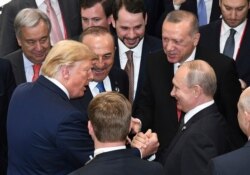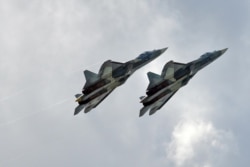U.S. President Donald Trump's decision to block the sale of the advanced F-35 jet to Turkey means Ankara may look elsewhere to replace its aging air force.
Trump's veto in response to Turkey’s acquisition of Russian missiles could prompt Ankara to turn to Moscow again.
Trump's announcement followed the first deliveries of Russia's S-400 air defense missile system to Turkey. Washington had repeatedly warned Ankara that the S-400's advanced radar could compromise the F-35 stealth technology, making delivery of the jet impossible.
However, Trump's decision appears to have taken Turkish President Recep Tayyip Erdogan by surprise.
"Tayyip Erdogan really trusted Trump," said international relations professor Huseyin Bagci of Ankara's Middle East Technical University. "In last month's G-20 meeting in Japan, they were sitting together and Trump [was] saying it's easy to do business with this these guys.
"It created the expectation that he will prevent the embargo on the F-35, but Trump gave into strong domestic pressure," he added.
In a statement issued late Wednesday, Turkey’s foreign ministry called the decision to exclude it from the F-35 program a mistake, dismissing the Pentagon’s concerns.
The statement also warned the U.S. decision would cause irreparable harm to relations between Washington and Ankara.
Vital to military fleet
Turkey is one of the biggest international buyers of the F-35, with an order of 100 of the expensive planes. The jets were a vital part of the Turkish military's long-term plan to replace its fleet of F-16s, some of which are decades old.
Further complicating the situation, Turkey's neighbor and rival, Greece, could acquire the F-35, gaining a decisive military edge.
"Future potential foreign military sales customers include Singapore, Greece, Romania, Spain and Poland," Vice Admiral Mathias Winter, the head of the Pentagon's F-35 office, said in testimony to the U.S. Congress.
Athens and Ankara have a series of territorial disputes, and Turkish and Greek jets routinely contest airspace in mock dogfights. For now, both sides are equally matched with F-16s.
Turkish Defense Minister Hulusi Akar insisted in April that Turkey was prepared for any termination of the F-35 sale.
"We have short-term, medium-term and long-term plans," Akar said.
Ankara has taken some initial steps to build its own fighter, but many experts dismiss the project as fanciful, based on cost and expertise.
"Probably Turkey will look now to the Chinese- or Russian-produced jet fighters, which would further alienate Turkey to the West and push Turkey to the East. There will be a restructuring of course in the Turkish army if the F-35 is not provided," Bagci said.
Moscow indicated its openness to selling its latest fighter jet, the Su-57.
"These fifth-generation Russian fighter jets [the Su-57] have outstanding qualities and show promise for export," Sergey Chemezov, head of Rostec, which manufactures the Su-57, said in a May interview with Turkey's news agency.
Su-57 buyers sought
Rostec is urgently looking for buyers of the Su-57 since India pulled out of the project. Moscow initially was able to buy a handful of the expensive planes, although last month it ordered another 76.
However, analysts warn any move by Ankara to further deepen its dependence on Russian weapons would further strain its relations with its NATO partners. NATO has voiced strong concerns about Turkey's purchase of two batteries of S-400 missiles.
A significant procurement of advanced Russian jets could push Turkey's NATO's ties to a breaking point.
"Logically, it's possible you can buy S-400, you can buy Russian fighter bombers," Haldun Solmazturk, head of the Ankara-based 21st Century Turkey Institute, said.
"But this would require a fundamental political decision," he added, "not just the Turkish government, but including Turkish parliament, Turkish public. This would be a national decision similar in 1946 when Turkey opposed the Soviet Union and applied to join NATO in 1949.
"Such a decision would be equally important, equally critical. It would be a junction point in Turkish political, military history," Solmazturk said.
However, given that Erdogan appears to have been wrong-footed by Trump's vetoing of F-35s, analysts suggest Ankara is most likely scrambling to form a new strategy.
"We have got to this point by a series of diplomatic accidents, not by intention," Bagci said. "The Turkish mind is confused. There is no clear mind in the heads of Turkish politicians. Erdogan, his defense and foreign ministers, this trio have to talk now on what to do. There is always the possibility to keep the channels open to Washington to find a solution.
"Otherwise, it’s bye-bye, Washington relations and NATO," he said.






